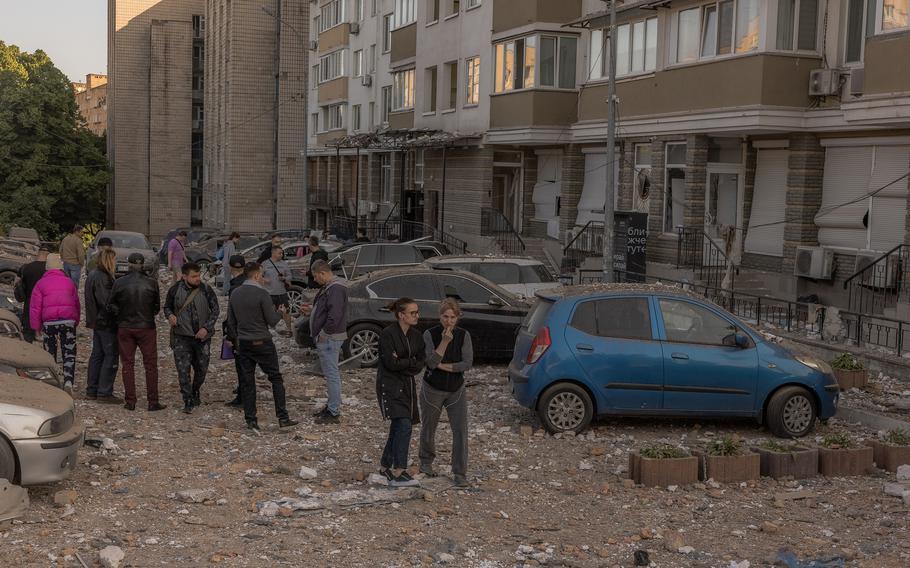Europe
Ukraine’s allies push back on striking targets in Russia
Bloomberg News May 31, 2023

Residents gather at the site where an apartment building was hit during Russian drone attacks on May 30, 2023, in Kyiv, Ukraine. (Roman Pilipey, Getty Images/TNS)
(Tribune News Service) — The U.S. and European allies urged caution on whether Ukraine should have the right to strike inside Russia, amid concerns that a potential escalation could drag them into a broader war.
Countries supporting Ukraine are taking varying stances on how it should beat back Moscow’s invasion, as Russian territory is increasingly targeted. The U.S. has publicly leaned against the strategy of attacks within Russia.
UK Foreign Secretary James Cleverly told reporters in Estonia this week that Ukraine “has the right to project force beyond its borders to undermine Russia’s ability to project force into Ukraine itself.” Cleverly, who said he wasn’t commenting on Tuesday’s drone strikes on Moscow, added that “legitimate military targets beyond its own border are part of Ukraine’s self-defense.”
But other allies are more cautious. While France backs Ukraine’s right to defend itself, French military support should not be used to attack Russia, a French official said. The official added that if Ukraine wants to do more with its own forces, it’s not France’s place to dictate to Kyiv how to conduct this war.
Another European diplomat said that allies tend not to discuss the question because it is divisive.
Russia has faced minor attacks on its own territory for months, including this week when Russia said five drones aimed at Moscow were shot down and three intercepted by electronic jamming. The city’s mayor said several residential buildings were damaged in the attack. Nobody was hurt.
‘Operational choices’
Russian regions near Ukraine have come under fire repeatedly in recent weeks, with officials ordering some residents in the Belgorod region to evacuate their homes. A drone attack caused a fire at the Afipsky oil refinery in southern Russia’s Krasnodar region, the local governor said on his Telegram channel Wednesday, adding that it was later extinguished.
NATO Secretary General Jens Stoltenberg was reluctant to be drawn on the use of western weapons to attack Russia. “The operational choices about how they use the weapons must be made by Ukrainians themselves,” Stoltenberg told reporters in Oslo on Tuesday, ahead of a two-day meeting of the bloc’s foreign ministers. “There are difficult choices.”
John Kirby, spokesman for the U.S. National Security Council, told CNN on Wednesday that once Washington provided systems to the Ukrainians, they get to decide what to do with the arms. “Now, they have given us assurances that they won’t use our equipment to strike inside Russia. But once it goes to them, it belongs to them,” Kirby said.
“We don’t want our systems, we don’t want to encourage or enable, attacks inside Russia,” Kirby added.
Zelenskyy’s assurances
The U.S. this month dropped its reluctance to allow allies to train Ukrainian pilots on F-16 fighter jets. President Joe Biden has said he received assurances from Ukrainian President Volodymyr Zelenskyy that Kyiv wouldn’t use the aircraft to move into Russian territory.
Latvia first suggested last year that Ukraine should be free to strike military sites inside Russia as it fends off attacks on its critical infrastructure. “We should allow Ukrainians to use weapons to target missile sites or air fields from where those operations are being launched,” Latvian Foreign Minister Edgars Rinkevics said at the time.
The UK earlier this month agreed to provide Ukraine with long-range Storm Shadow cruise missiles to help it counter Russian offensives. The weapons, which were jointly developed by the UK and France, have a firing range in excess of 155 miles and are the longest-range missiles yet provided to Ukraine by western allies.
UK Defence Secretary Ben Wallace said that the Storm Shadows, which are usually launched from the air, would be used to push back Russian troops “within Ukrainian sovereign territory.” The UK was given assurances that they would not be used against targets inside Russia, according to a person familiar with the matter.
By contrast, U.S. officials have held back on sending the Army Tactical Missile System, known as ATACMS, due to its ability to strike targets inside Russian territory.
With assistance from Iain Marlow, Sylvia Westall, Alex Morales and Jennifer Jacobs.
©2023 Bloomberg L.P.
Visit bloomberg.com.
Distributed by Tribune Content Agency, LLC.